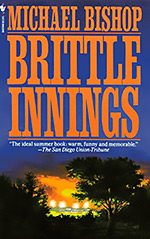
![]() couchtomoon
couchtomoon
4/14/2015
![]()
The afternoon's fractured dazzle hung on us like warm honey, golden and clingy (43).
...and sweet and sticky, cloying and suffocating. An apt description for a novel thick with the muggy, oppressive climate of the southern United States in the midst of World War II and at the height of baseball season, where nostalgia ambers and crystallizes the past, but stops short of sweetening reality.
But this is a tale about monsters. The daily monsters. The people monsters. The go-about-your-business-and-don't-you-dare-try-to-change-the-status-quo monsters. The oppression monsters.
It's the perfect place for a real monster to hide.
Legendary baseball recruiter Danny Boles recounts his early days as a 17-year-old unknown ball player from Oklahoma enlisted to play for the class-C Hellbenders of Georgia. He spends that first year of his ball career living in a decaying southern mansion with his teammates, sharing a sweltering attic room with the enigmatic Hank "Jumbo" Clerval. Boles shares his memories of daily life and big games as team jealousies and racial tension course through the tale.
Southern gothic in flavor, but never quite so peculiar, Bishop has too much respect for his characters to reduce them to picaresque caricatures of eerie and vain. Too often, the southern gothic aesthetic serves to overshadow unpleasant social oppression, softening racism through its surreal lens. InBrittle Innings, Bishop's people are real and genuine in their flaws, products of their time, active players in a backwards era. This is an era of state-sponsored racism, when the law guarantees White advantage, even in baseball, and Bishop won't let us forget it. "...Federal law forbids inducting Negroes in greater number than they appear in the general population" [Ch. 16], he reminds us.
But that doesn't mean Bishop condemns his characters to the evil versus oppressed charade. Every character achieves complexity; no one is easily defined. Social roles are fragile, dangerous. Bishop shows us the cracks in this society. The tension so brittle it could snap at any moment.
Yet Bishop brings to life these heavy characters with crisp, light, unforgettable details: "Her voice was like Coca-Cola: sweet and fizzy, with a sting" (Ch. 1) and "Sometimes you could hear pocket change in his chuckles" (Ch. 40). Danny's psychologically-inflicted muteness compliments and frustrates his rowdy teammates: "Silence seemed easier sometimes, nobler others, and sometimes just happily worrisome for the persnickety folks who wanted either answers or explanations out of me" (Ch. 39).
For the giant Hank "Jumbo" Clerval, his eloquence speaks volumes about his personality:
No longer do I blaze like a furnace. I don't need women to fuel me. Thus, my capacities for a higher passion channel into three sustaining reservoirs: atonement, human companionship, and baseball. (Ch. 36)
We get the immediate sense that Hank is not your typical athlete. And when he later says, "Fuck you sempiternally," (Ch. 57) you have to wonder...
Of course, by that time, you already know the thing you can't know right now.
I have little regard for spoiler alerts. "The Big Reveal" rarely has anything to do with the salient experience of any novel, but this is one time when I will bite my tongue. It's the axis of the tale, though not the tale itself, and, really, the subject itself isn't nearly as interesting as how Bishop plays with it. You'll know before you know, and Bishop handles this feature beautifully.
But it's not all perfect. Bishop relies too heavily on phonetic spelling in this heavily accented, racially-split, southern culture. Offensive in some ways, tiresome in others, a few well-placed words of slang, or an occasional dropped consonant would better encourage the reader to pick up southern speech patterns. Bishop, a White author, doesn't shy from race-- even his protagonist in his acclaimed No Enemy but Time (1982) is Black, for whom he writes in first-person, though in a considerably more generic fashion for that character. In Brittle Innings, the voicing is an unintended offense, an overt attempt at realism, but Bishop's overall respect for his marginalized characters is apparent. Still, we should add this one to the White authors writing non-White culture controversy pile.
Fortunately, the exaggerated voicing doesn't distract from the overall delicacy of the tale. In magical realism, writers don't build worlds, they build atmosphere, and Bishop's southern gothic-lite atmosphere swelters and lulls to southern perfection. "You could smell the DDT on the cotton plants across the road, and the used-washcloth odor of the linens in Gladiola Delight" (39). And just like those honey-covered afternoons, the entire narrative drips with sticky lethargy. And sometimes, it's hard to put the cap back on.
http://couchtomoon.wordpress.com